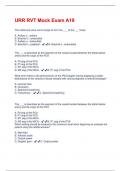Exam (elaborations)
URR RVT Mock Exam A19 With Questions And Answers Graded A+
- Course
- Institution
The radial and ulnar veins merge to form the ___ at the ___ fossa. A. Axillary v., axillary B. Brachial v., antecubital C. Axillary v., antecubital D. Brachial v., popliteal - ️️B. Brachial v., antecubital The ___ is describes as the segment of the vessel located between the distal basilar...
[Show more]



